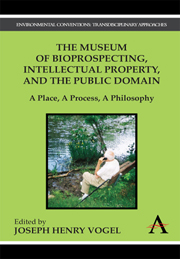 The Museum of Bioprospecting, Intellectual Property, and the Public Domain
The Museum of Bioprospecting, Intellectual Property, and the Public Domain Book contents
- Frontmatter
- Contents
- List of Figures
- Preface
- Acknowledgements
- Introduction: The Bauplan
- Chapter 1 Looking the Gorgon in the Face
- Chapter 2 Museums as Venues for Polemics
- Chapter 3 The Museum as a Vehicle for Considered Judgments on Access and Benefit Sharing
- Chapter 4 Clearing the Air: Applying the Intellectual Property Framework to National, Community, and Individual Rights in The Convention on Biological Diversity
- Chapter 5 The Anti-Commons Threat to Farmers' Rights: The Case of Crop Germplasm
- Chapter 6 The Moral Foundations of Intellectual Property and Conservation through Access and Benefit-Sharing
- Conclusions: The Nameless Interloper in The Museum of Bioprospecting, Intellectual Property, and the Public Domain
- Appendix: The Original Essay: A Proposal Based on “The Tragedy of the Commons:” Museum of Bioprospecting, Intellectual Property Rights, and the Public Domain
- Notes
- Index
Chapter 3 - The Museum as a Vehicle for Considered Judgments on Access and Benefit Sharing
Published online by Cambridge University Press: 05 March 2012
- Frontmatter
- Contents
- List of Figures
- Preface
- Acknowledgements
- Introduction: The Bauplan
- Chapter 1 Looking the Gorgon in the Face
- Chapter 2 Museums as Venues for Polemics
- Chapter 3 The Museum as a Vehicle for Considered Judgments on Access and Benefit Sharing
- Chapter 4 Clearing the Air: Applying the Intellectual Property Framework to National, Community, and Individual Rights in The Convention on Biological Diversity
- Chapter 5 The Anti-Commons Threat to Farmers' Rights: The Case of Crop Germplasm
- Chapter 6 The Moral Foundations of Intellectual Property and Conservation through Access and Benefit-Sharing
- Conclusions: The Nameless Interloper in The Museum of Bioprospecting, Intellectual Property, and the Public Domain
- Appendix: The Original Essay: A Proposal Based on “The Tragedy of the Commons:” Museum of Bioprospecting, Intellectual Property Rights, and the Public Domain
- Notes
- Index
Summary
Since the Convention on Biological Diversity (CBD) entered into force in December 1993, discussion of access to genetic resources and the sharing of benefits (ABS) has penetrated intellectual property rights (IPR) forums at the national, regional, and international levels. The debates have spawned a series of derivative issues that now constitute a full-fledged legislative agenda. Under the umbrella of the CBD, one finds the implications of IPR for biosafety, agrobiodiversity, and traditional knowledge (TK).
You lawyers must have uncorked the champagne a few weeks early in 1993! Or should I say “sparkling wine” if the bottle wasn't shipped out of Champagne, France? Nudge, nudge. (The interloper from the previous chapters is in fine form.)
Is expansion necessarily “progress?” How does one measure progress in reconciling IPR and the CBD or vice versa? The simplest way is to gauge the follow-up of IPR in the evolving framework of the CBD. Bean counters need beans to count. Nine Conferences of the Parties (COP) to the CBD have been held since the first one was convened in Nassau, Bahamas in 1994 and over one hundred decisions have been adopted. The official recommendations from the Subsidiary Body on Scientific, Technical and Technological Advance (SBSTTA) also number in the hundreds. In terms of the quantity of bureaucratic infrastructures, almost all of the 190 countries which are party to the CBD, as of this writing, have at least a desk or an officer encharged with IPR issues.
- Type
- Chapter
- Information
- The Museum of Bioprospecting, Intellectual Property, and the Public DomainA Place, A Process, A Philosophy, pp. 29 - 38Publisher: Anthem PressPrint publication year: 2010


